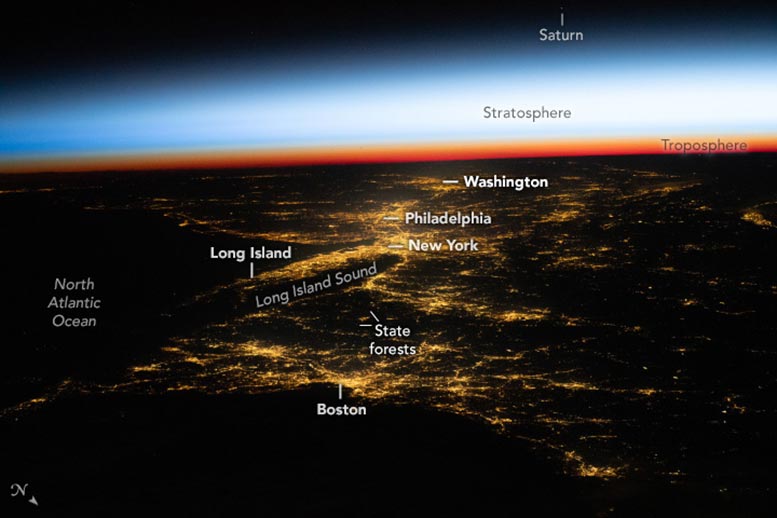This is from the ISS watching us
By WILFREDO GARCÍA LÓPEZ, NASA EARTH OBSERVATORY
 |
| Annotated photo of the northeastern United States captured on January 17, 2024, by an astronaut aboard the International Space Station. |
This photograph, captured by an astronaut aboard the International Space Station (ISS) while orbiting over Newfoundland, Canada, offers a captivating perspective of the northeastern United States.
The photo highlights the stark contrast between sprawling urban lights and the darkness of rural landscapes and water bodies, such as the Nipmuck and Natchaug state forests and Long Island Sound.
Several of the largest U.S. cities are visible, including
New York, Washington, and Philadelphia. These well-lit cities, along with
Boston, Long Island, and the lighted roads that connect them, reflect patterns
of urbanization extending to the coastline. Scientists have shown that population density correlates with the
brightness of urban landscapes in nighttime imagery.
As the Sun dips below the curvature of Earth, the varying layers of the atmosphere appear as different hues in this oblique photograph of Earth’s limb. The troposphere, the lowest layer of the atmosphere, appears red and yellow.
The stratosphere, the layer above, displays tones of light blue that gradually fade until reaching the upper atmosphere. The planet Saturn shines as a small white speckle visible along the upper-right edge of the photo.
Astronaut photograph ISS070-E-76065 was acquired on January 17, 2024, with a Nikon D5 digital camera using a focal length of 200 millimeters. It is provided by the ISS Crew Earth Observations Facility and the Earth Science and Remote Sensing Unit, Johnson Space Center.
The image was taken by a member of the Expedition 70 crew. The image has been cropped and enhanced to improve contrast, and lens artifacts have been removed.
The International Space Station Program supports the laboratory as part of the ISS National Lab to help astronauts take pictures of Earth that will be of the greatest value to scientists and the public, and to make those images freely available on the Internet. Additional images taken by astronauts and cosmonauts can be viewed at the NASA/JSC Gateway to Astronaut Photography of Earth.